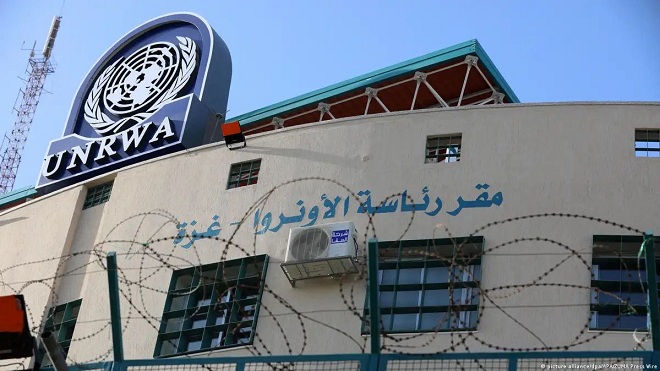اتهمت جيش الاحتلال باستخدام الفلسطينيين" دروعًا بشرية.. صحف غربية: حظر إسرائيل للأونروا كارثة على غزة
غزة | 3 نوفمبر, 2024 - 10:26 م
ترجمة خاصة: يمن شباب نت

وكالة غوث وتشغيل اللاجئين الأونوروا
 موسم التخفيضات.. فرصة محدودي الدخل للشراء والتجار لبيع المستلزمات المكدسة
موسم التخفيضات.. فرصة محدودي الدخل للشراء والتجار لبيع المستلزمات المكدسة  أغرت وزراء ومسؤولين.. وزير يمني سابق يكشف عن مخططات الإمارات لتفكيك الشرعية في اليمن
أغرت وزراء ومسؤولين.. وزير يمني سابق يكشف عن مخططات الإمارات لتفكيك الشرعية في اليمن  صحيفة سعودية: عيدروس الزبيدي اتخذ من القضية الجنوبية شماعة لتنفيذ أجندات خارجية
صحيفة سعودية: عيدروس الزبيدي اتخذ من القضية الجنوبية شماعة لتنفيذ أجندات خارجية  مليشيا الحوثي تواصل إخضاع أكاديميي وموظفي جامعة إب لتدريبات قتالية
مليشيا الحوثي تواصل إخضاع أكاديميي وموظفي جامعة إب لتدريبات قتالية  إحصائية رسمية: أكثر من 16 ألف إصابة و106 وفاة بالحصبة خلال العام المنصرم
إحصائية رسمية: أكثر من 16 ألف إصابة و106 وفاة بالحصبة خلال العام المنصرم  خلال اتصال مع بن سلمان.. أردوغان يشدد على أهمية حماية وحدة أراضي اليمن
خلال اتصال مع بن سلمان.. أردوغان يشدد على أهمية حماية وحدة أراضي اليمن 
 موسم التخفيضات.. فرصة محدودي الدخل للشراء والتجار لبيع المستلزمات المكدسة
موسم التخفيضات.. فرصة محدودي الدخل للشراء والتجار لبيع المستلزمات المكدسة  أغرت وزراء ومسؤولين.. وزير يمني سابق يكشف عن مخططات الإمارات لتفكيك الشرعية في اليمن
أغرت وزراء ومسؤولين.. وزير يمني سابق يكشف عن مخططات الإمارات لتفكيك الشرعية في اليمن  صحيفة سعودية: عيدروس الزبيدي اتخذ من القضية الجنوبية شماعة لتنفيذ أجندات خارجية
صحيفة سعودية: عيدروس الزبيدي اتخذ من القضية الجنوبية شماعة لتنفيذ أجندات خارجية  مليشيا الحوثي تواصل إخضاع أكاديميي وموظفي جامعة إب لتدريبات قتالية
مليشيا الحوثي تواصل إخضاع أكاديميي وموظفي جامعة إب لتدريبات قتالية  إحصائية رسمية: أكثر من 16 ألف إصابة و106 وفاة بالحصبة خلال العام المنصرم
إحصائية رسمية: أكثر من 16 ألف إصابة و106 وفاة بالحصبة خلال العام المنصرم  خلال اتصال مع بن سلمان.. أردوغان يشدد على أهمية حماية وحدة أراضي اليمن
خلال اتصال مع بن سلمان.. أردوغان يشدد على أهمية حماية وحدة أراضي اليمن 
غزة | 3 نوفمبر, 2024 - 10:26 م
ترجمة خاصة: يمن شباب نت

وكالة غوث وتشغيل اللاجئين الأونوروا